Ecommerce: To Host or Not to Host
So many vendors are offering ecommerce tools/systems that determining the right one for you can be overwhelming, especially if you’re just beginning. There are many factors to consider, such as […]
So many vendors are offering ecommerce tools/systems that determining the right one for you can be overwhelming, especially if you’re just beginning. There are many factors to consider, such as the catalog and browsing features, payment processing, advertising tools, customer service, ongoing support, design options and site activity analytics, just to name a few. However, in this post, we will start with one of the first questions you should ask yourself: Do I need a custom or a hosted solution? What’s the difference anyway?
Today, most ecommerce websites are created using either a hosted, off site, solution or a custom, open source, website solution. Both hosted and custom ecommerce solutions are very different from one another and those differences will the focus of this post.
The main difference between the two options is that a hosted ecommerce solution is premade by a software company, all configurations will be handed by your ecommerce solution provider and it can be up and running within hours or a couple of days. This is the easy route if your ecommerce requirements can be met by an out-of-the-box solution.
In addition, hosted ecommerce sites are typically less expensive upfront because there is usually no to low startup costs and a minimal monthly fee to keep your site up and running. Customers who choose to go with a hosted solution also don’t have to worry about website maintenance, because generally, hosted ecommerce solutions will cover this.
Sounds perfect, right? There are downsides to a hosted ecommerce solution to consider. The first one is that it is not owned by you, the business owner. If you stop paying the monthly fee, you will lose your site and will be looking for a new solution.
In addition, generally, the code for a hosted ecommerce solution is locked and cannot be easily modified, making ecommerce cart design and feature customization nearly impossible. With hosted ecommerce solutions, you get the features the system comes with as is, without any ability to add/edit/remove features. If you have a basic ecommerce store this is usually not a problem. If you are anticipating the need for second generation features and will eventually want the ability to modify features and grow the website into a more feature rich solution, you may need to move to a custom ecommerce solution.
With regards to design, you won’t be able to create multiple templates for the same page and will be forced to use the templates made available by the provider. Because of this limitation, variance testing between differing templates or processes (e.g., one page vs. multi-page checkout) is virtually impossible with a hosted solution.
Last but not least, search engine optimization for hosted ecommerce solutions is not as robust and often more difficult to implement. Most of the time, a search engine optimization company is limited in what can be changed on a hosted ecommerce site’s structure, meaning you can easily be left with an incomplete solution or an expensive round of customizations.
As you have probably deduced, custom, or “Open Source” ecommerce solutions can be even more expensive than hosted solutions. The largest difference in cost lies in the development and design hours required to get the site up and running. This option is typically chosen when the owner wants to present a very professional, serious, high-end user experience – requiring numerous hours to be spent creating a custom look, features and functionality that may be needed for you and your future users, which may not be attainable with a hosted, prepackaged solution. When considering the higher upfront costs to purchase the software, keep in mind the cost/fees of a hosted solution (anywhere from $50 per month to $2,000 per month) and understand that you generally will not start seeing a return on your investment until after the first year.
Typically, the term Open Source means you or your developer have total access to the ecommerce software code and can make any and all changes that your skill level will allow. The obvious advantages to this, provided your developer is extremely proficient in programming, design and search engine optimization, your site can work and function as you wish. Custom ecommerce sites can look any way you want, sell products anyway you want, and display products anyway you want. In addition, this option will obviously allow for future growth, variation testing and change on the fly without having to redo the entire site.











